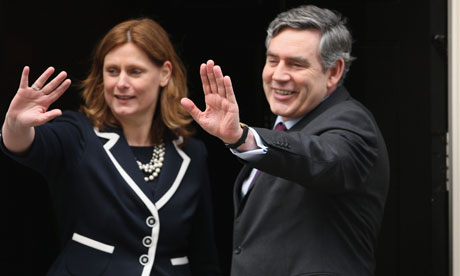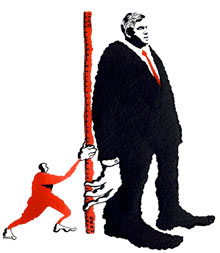The judgments for which Gordon Brown was mocked look rather different now we've seen David Cameron in action

Gordon Brown and his wife Sarah say
farewell to the German chancellor, Angela Merkel, at a meeting at No 10
on the eve of the 2009 G20 summit. Photograph: Dan Kitwood/Getty Images
Few arguments are more unfashionable than the one I am about to make: the case for Gordon Brown. Unfashionable because, 18 months after he left office having led Labour to its second worst result since 1918, Brown still arouses intense loathing. At the Conservative party conference I saw otherwise calm Tories foam with anger at the mention of the former prime minister, furiously tearing away at his every trait, personal and political. That hatred is outdone in some corners of the Labour forest by diehard Blairites still seething at the memory of how Brown thwarted their hero in Downing Street before chasing him out of it.
 Illustration by Belle Mellor
Illustration by Belle Mellor
With enemies on both sides, that leaves few defenders in the press, a fact compounded by the ex-PM's near-total invisibility, his appearances in the Commons rare. The torrent of memoirs from colleagues, Alistair Darling's the latest, have only damaged his reputation still further.
Not many would attempt to push aside the mountain of anecdotes detailing Brown's impossible behaviour as both colleague and boss. Even his most ardent admirers now accept that Gordon Brown was temperamentally unsuited to the job of prime minister.
And yet posterity's judgment of leaders does not rest solely in their hands. The conduct of their successors matters too: Clinton looked better after George W. History may yet have similar second thoughts about Brown, reviewing his record in the light of what has followed.
Take last week's fiasco of a G20 meeting in Cannes, which did little to solve the crises in Greece and Italy, and whose most enduring legacy may prove to be off-mic comments made by the host, Nicolas Sarkozy. Contrast that with the meeting of the same group chaired by Brown in London in April 2009, which agreed a $5tn stimulus to the world economy and was duly hailed for preventing a global recession tipping over into a global depression. A year later the highly respected Brookings Institution predicted "that in coming years, the London G20 summit will be seen as the most successful summit in history".
Part of that was good fortune on Brown's part: in 2009 the US and Germany were in broad agreement on what needed to be done. But much of it was down to Brown's own actions as chair. The very attributes that infuriated his domestic colleagues were put to their best use: he worked around the clock preparing for that summit, hectoring, manoeuvring and bullying his fellow world leaders until they had buckled to his will. These were the same behind-the-scenes methods he had used a decade earlier as he pushed fellow finance ministers to relieve developing countries' debts. It wasn't pretty, it wasn't telegenic, but it was effective.
How very different it is today. It was ironic to hear George Osborne castigate his European counterparts for simply "waiting on developments", since that's exactly what he and David Cameron do at these international powwows. One veteran of the summit circuit says that the two Brits regularly turn up with no agenda of their own, so unlike Brown and, to be fair, Tony Blair, who almost always arrived with a plan, ensuring, in the tired phrase, that Britain punched above its weight. (I'm told that, rather poignantly, Brown is still the man with a plan: he was ready with detailed proposals on jobs and global finance had Osborne not blocked him for the top post at the IMF.)
What is even harder for the Tories to stomach is that it was Brown who delivered what they themselves long insisted was the critical policy goal of the past two decades: keeping Britain out of the euro. It was Brown and his legendary five, impossible-to-meet tests that restrained the gung-ho Blair and ensured Britain stayed out of the single currency. Absurdly, Osborne has tried to give the credit for that to William Hague and his save the pound campaign, which rather forgets that both Hague and his campaign were crushed in 2001. If Eurosceptics want to have a hero whose picture they can put on the wall alongside the sainted Margaret, I'm afraid that it's got to be Gordon. That they can't is testament to a visceral hatred not only of Brown but of his chief lieutenant at the time, whose opposition to the euro was total and decisive: Ed Balls.
Least fashionable of all is the case that Brown was right on the deficit. The coalition's entire programme is predicated on the notion that Brown was incontinent with the nation's money, running up colossal debts. But the rise in borrowing from some £40bn to £170bn was not the result of a crazed spending spree. It was the consequence of the crash of 2008 and the subsequent collapse in economic activity, consisting mostly of increased welfare payments – including the dole for those thrown out of work – and declining tax revenues caused by fewer people earning wages. This was a deficit created by crisis, not by profligacy.
If Brown was not the source of the disease, what about his remedy? His preferred approach – over which he fought with, and lost to, Darling among others – was to secure the recovery first, get the economy ticking over nicely, and only then start attacking the deficit. If the economy were growing, shrinking the deficit would be less painful; tackling it too early risked sucking out demand, choking off the recovery and so, paradoxically, increasing the deficit.
Well, guess who called it right. The last quarter with Brown in charge saw growth of just over 1.1%, surpassing all expectations, with unemployment coming down. The economy appeared to be getting back on its feet. But then the deficit fetishists of the coalition took over and the economy stalled, with more growth in that last Brown quarter than in the next four Cameron quarters combined. Suddenly Brown's insistence that growth had to come first looks prescient and wise.
Indeed, there are judgments big and small for which Brown was mocked at the time but which look rather different now. As PM, he overruled Darling, preferring to increase national insurance rather than VAT. Now, thanks to Osborne, we've seen the calamitous impact of a VAT rise on both inflation and demand. More crucially, Brown realised at the start that the economy had to be central, refusing to be diverted to other projects, however worthy, including promised constitutional reform. Barack Obama may well wish he had made the same call, putting healthcare to one side and focusing exclusively on jobs.
Of course, there was much that Brown got badly wrong. Hailing the end of boom and bust was absurd; relying on City and house price bubbles to raise cash was fatal; failing to run a surplus during the good times foolhardy.
But what's intriguing is that these were mistakes made as chancellor, on which Brown's standing remains high. Perhaps a revision is in order, downgrading his record in No 11 but upgrading his performance in No 10. The Conservatives won't ever undertake such an act of revision, the historians might not do it for decades to come. But Labour, whose future prospects partly depend on knowing what to say about its recent past, should do it much sooner.

No comments:
Post a Comment